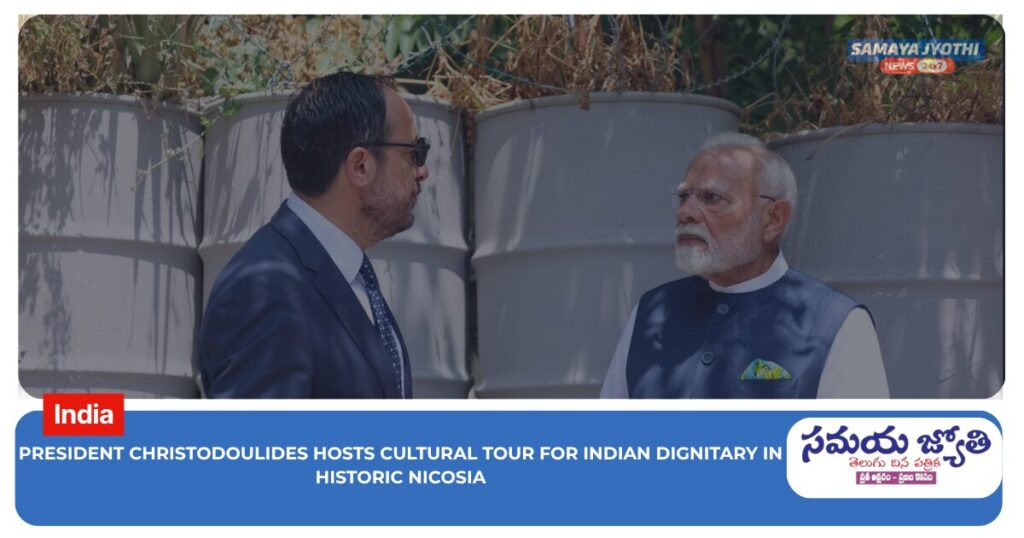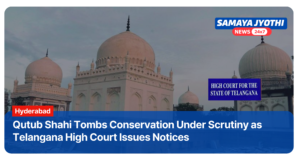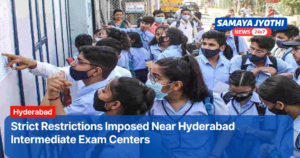- Home
- India, Latest News
- Nicosia Cultural Tour Deepens India-Cyprus Ties
President Christodoulides Hosts Cultural Tour for Indian Dignitary in Historic Nicosia
India and Cyprus Strengthen Ties Through Cultural Diplomacy in Nicosia
Samaya Jyothi
Nicosia, Cyprus – June 16, 2025
In a warm gesture reflecting the deepening relationship between India and Cyprus, President Nikos Christodoulides of Cyprus recently welcomed an Indian dignitary for a personal tour of the culturally rich and historic city of Nicosia. The visit, which highlighted the enduring heritage and architecture of one of Europe’s oldest divided capitals, was marked by expressions of mutual appreciation and hope for stronger people-to-people ties.
President Christodoulides personally showcased significant historical landmarks, including the Venetian walls, the Cyprus Museum, and the vibrant neighborhoods of the old town. The Indian guest, visibly moved by the experience, conveyed heartfelt gratitude, stating, “Gratitude to President Christodoulides for showing me parts of the very historic city of Nicosia. We look forward to closer people-to-people linkages with Cyprus.”
This symbolic gesture is seen as part of broader efforts to enhance diplomatic and cultural ties between the two nations. While political and economic cooperation remains central to India-Cyprus relations, the focus on cultural diplomacy and heritage exchange represents a new chapter in fostering deeper mutual understanding.
Nicosia, known for its unique blend of Byzantine, Ottoman, and modern European architecture, has long stood as a symbol of resilience and unity in diversity. By offering a personal tour, President Christodoulides not only demonstrated the richness of Cypriot heritage but also extended a hand of friendship rooted in shared values of democracy, culture, and community.
The Indian dignitary’s visit to Cyprus comes at a time of renewed bilateral engagement. Both nations have shown increasing interest in boosting cooperation in sectors such as education, tourism, technology, and trade. However, cultural exchanges like this visit are instrumental in humanizing these initiatives and laying the foundation for long-term goodwill.
According to diplomatic sources, the meeting and tour also included discussions about future cultural exchange programs, including academic partnerships, art exhibitions, and tourism promotions that highlight Indo-Cypriot heritage. An agreement on facilitating student exchanges and collaborative research on ancient civilizations is also under consideration.
“Cyprus and India share millennia of history through trade, faith, and migration. Reviving these shared narratives through cultural diplomacy is the bridge to future collaborations,” said a senior official from the Ministry of Foreign Affairs in Cyprus.
This event has sparked interest among cultural historians and policy analysts alike. Many view this as a timely example of how soft power and personal diplomacy can be powerful tools in international relations. The Indian dignitary’s remarks on “closer people-to-people linkages” underscore the significance of such symbolic moments in diplomacy.
On social media, the visit quickly gained traction. Citizens of both nations praised the authenticity of the exchange, with many calling for more initiatives that bring people from different cultures together through shared experiences and storytelling.
In recent years, India has actively engaged in cultural diplomacy as part of its broader foreign policy strategy. Similarly, Cyprus, with its strategic location in the Mediterranean and its status as a bridge between East and West, is uniquely positioned to act as a cultural conduit between Europe and Asia.
In his closing remarks, President Christodoulides stated, “The future of international cooperation lies in understanding and appreciating each other’s heritage. Today’s visit is a reminder that beyond borders and politics, it is our shared humanity that connects us.”
As the world becomes more interconnected, cultural tours such as this one in Nicosia reflect the evolving nature of diplomacy—one that places empathy, history, and people at the center of international engagement.
The visit concludes with optimism on both sides for expanding the relationship beyond government corridors, reaching classrooms, art galleries, and community centers. With commitments to future engagements and cultural collaborations, the path ahead for India and Cyprus appears brighter, deeply rooted in mutual respect and shared heritage.
Samaya Jyothi will continue to follow developments in Indo-Cypriot relations and the global role of cultural diplomacy in foreign af
Click for more latest news. Also get top headlines and latest news from India and around the world at samaya jyothi










